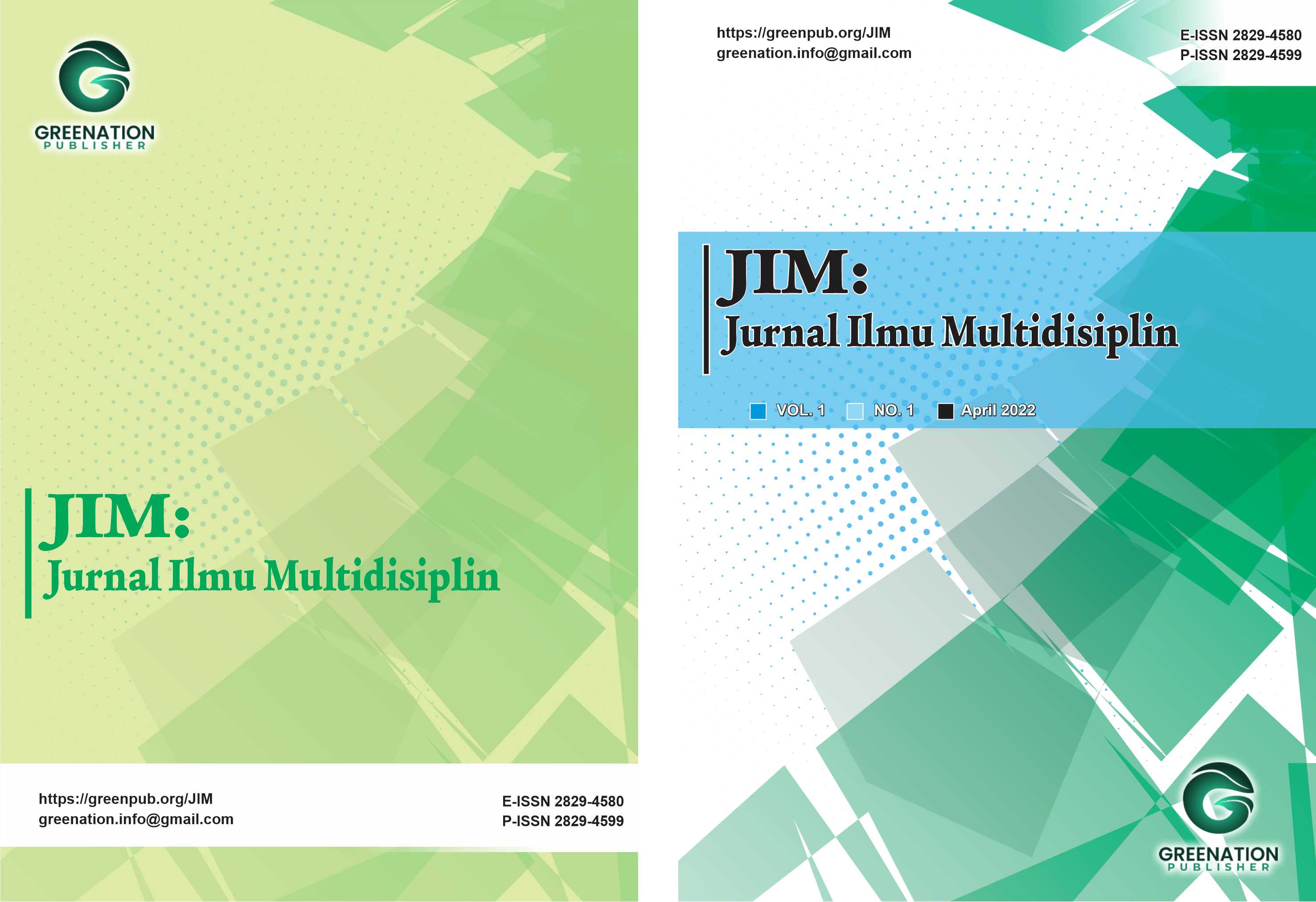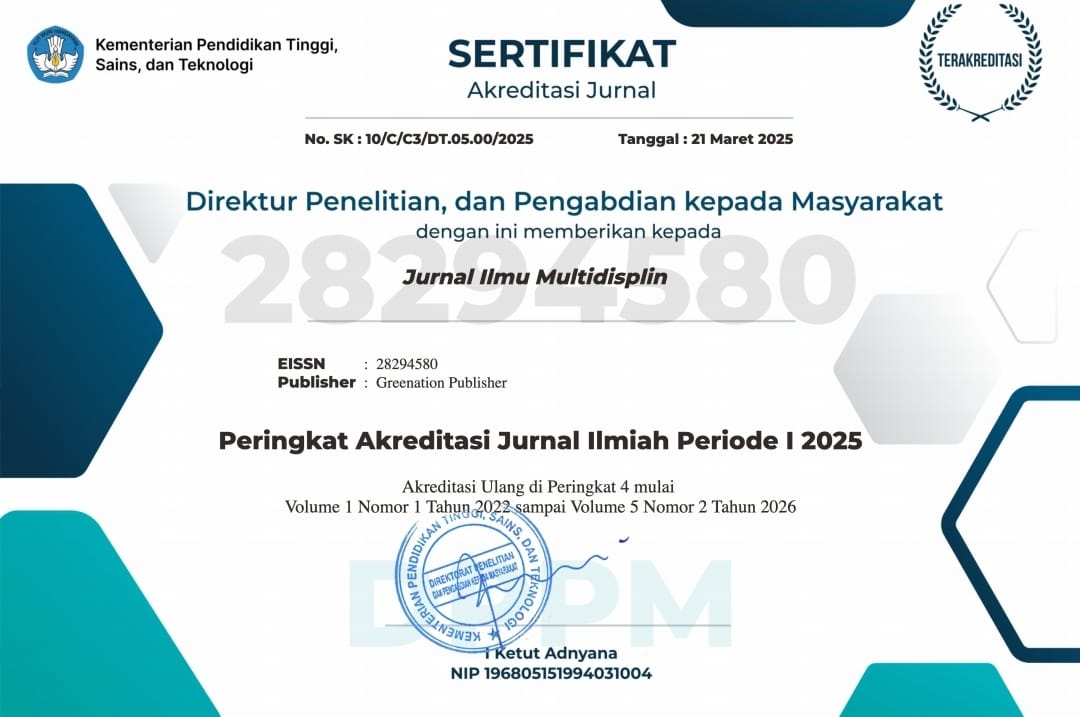Analisis Extended Theory of Planned Behavior (ETPB) terhadap Perilaku Masyarakat Kota Tanjungpinang dalam Menggunakan Transportasi Online
DOI:
https://doi.org/10.38035/jim.v4i4.1233Keywords:
Extended of Planned Behavior (ETPB), Intention to use, online TransportationAbstract
Penelitian ini bertujuan untuk menganalisis faktor-faktor yang mempengaruhi perilaku masyarakat Kota Tanjungpinang dalam menggunakan layanan transportasi online melalui pendekatan Extended Theory of Planned Behavior (ETPB). Model ETPB diperluas dengan menambahkan variabel accessibility, service quality, dan trust ke dalam kerangka dasar TPB (attitude, subjective norm, dan perceived behavior control). Data ini dikumpulkan melalui kuesioner dari 365 responden dan dianalisis menggunakan Partial Least Squares Structural Equation Modeling (PLS-SEM). Hasil menunjukkan bahwa semua variabel berpengaruh signifikan terhadap intention to use, kecuali accessibility terhadap attitude. Attitude menjadi mediator terkuat, diikuti oleh subjective norm dan perceived behavior control. Penelitian ini memberikan implikasi teoritis bagi pengembangan ETPB dalam konteks transpotasi online serta rekomendasi praktis bagi pemerintah dan penyedia layanan untuk meningkatkan kualitas dan kebijakan transportasi berbasis aplikasi.
References
Agriyanto, R. (2018). Model Rekayasa Perilaku Menggunakan Informasi Model Rekayasa Perilaku Menggunakan Informasi Akuntansi Berbasis Akrual Pada Organisasi Pemerintah. Jurnal Akuntansi dan Keuangan Indonesia, 15 (1).
Ali, N., Nakayama, S., & Yamaguchi, H. (2023). Using the extensions of the theory of planned behavior (TPB) for behavioral intentions to use public transport (PT) in Kanazawa, Japan. Transportation Research Interdisciplinary Perspectives, 17. https://doi.org/10.1016/j.trip.2022.100742
Arslannur, B., & Tortum, A. (2023). Public Transport Modeling for Commuting in Cities with Different Development Levels Using Extended Theory of Planned Behavior. Sustainability (Switzerland), 15(15). https://doi.org/10.3390/su151511931
Ayo, C. K., Mbarika, V. W., & Oni, A. A. (2015). The Influence of Trust and Risk on Intention to Use E-Democracy in Nigeria. Mediterranean Journal of Social Sciences. https://doi.org/10.5901/mjss.2015.v6n6s1p477
Borhan, M.N.; Ibrahim, A.N.H.; Miskeen, M.A.A.; Rahmat, R.A.O.K.; Alhodairi, A.M. Predicting car drivers’ intention to use low cost airlines for intercity travel in Libya. J. Air Transp. Manag. 2017, 65, 88–98
Budi Harto, Panji Pramuditha, Arief Yanto Rukmana, Harnavela Sofyan, Hana Rengganawati, Andina Dwijayanti, & Teti Sumarni. (2023). Strategi Social Media Marketing Melalui Dukungan Teknologi Informasi dalam Kajian Kualitatif Pada UMKM Kota Bandung. KOMVERSAL, 5(2), 244–261. https://doi.org/10.38204/komversal.v5i2.1499
Cahigas, M. M., Prasetyo, Y. T., Persada, S. F., Ong, A. K. S., & Nadlifatin, R. (2022). Understanding the perceived behavior of public utility bus passengers during the era of COVID-19 pandemic in the Philippines: Application of social exchange theory and theory of planned behavior. Research in Transportation Business and Management, 45. https://doi.org/10.1016/j.rtbm.2022.100840
Cariera Napitupulu, D., Basuki Joewono, T., & Fajarindra Belgiawan, P. (2023). The Influence of Attitudes, Subjective Norms, and Perceived Behavioral Control of Commuter Intentions to Use Public Transportation in Greater Bandung, Indonesia. The Asian Journal of Technology Management, 16(1), 13–31. https://doi.org/10.12695/ajtm.2023.16.1.2
Chou, C. C., Iamtrakul, P., Yoh, K., Miyata, M., & Doi, K. (2024b). Determining the role of self-efficacy in sustained behavior change: An empirical study on intention to use community-based electric ride-sharing. Transportation Research Part A: Policy and Practice, 179. https://doi.org/10.1016/j.tra.2023.103921
Chowdhury, S., Zhai, K., & Khan, A. (2016). The effects of access and accessibility on public transport users’ Attitudes. Journal of Public Transportation, 19(1), 97–113. https://doi.org/10.5038/2375-0901.19.1.7
Hasmidyani, D., Mardetini, E., & Eka Amrina, D. (2022). GENERASI Z DAN KEWIRAUSAHAAN: MENGUKUR INTENSI BERWIRAUSAHA BERBASIS THEORY OF PLANNED BEHAVIOR. JURNAL EKONOMI PENDIDIKAN DAN KEWIRAUSAHAAN, 10(1), 19–30. https://doi.org/10.26740/jepk.v10n1.p19-30
He, X., Stapel, J., Wang, M., & Happee, R. (2022). Modelling perceived risk and trust in driving automation reacting to merging and braking vehicles. Transportation Research Part F: Traffic Psychology and Behaviour, 86, 178–195. https://doi.org/10.1016/j.trf.2022.02.016
He, Y., Sun, Y., Zhao, Z., Chen, M., Waygood, E. O. D., & Shu, Y. (2024b). Impact of social-psychological factors on low-carbon travel intention: Merging theory of planned behavior and value-belief-norm theory. Heliyon, 10(6). https://doi.org/10.1016/j.heliyon.2024.e28161
Ibrahim, A. N. H., Borhan, M. N., & Rahmat, R. A. O. K. (2020). Understanding users’ intention to use park-and-ride facilities in malaysia: The role of trust as a novel construct in the theory of planned behaviour. Sustainability (Switzerland), 12(6). https://doi.org/10.3390/su12062484
Jamei, E., Chan, M., Chau, H. W., Gaisie, E., & Lättman, K. (2022). Perceived Accessibility and Key Influencing Factors in Transportation. In Sustainability (Switzerland) (Vol. 14, Issue 17). MDPI. https://doi.org/10.3390/su141710806
Li, W., Zhao, S., Ma, J., & Qin, W. (2021). Investigating regional and generational heterogeneity in low-carbon travel behavior intention based on a PLS-SEM approach. Sustainability (Switzerland), 13(6). https://doi.org/10.3390/su13063492
Madha, A.; Salman, A.; Hussain, H.; Borhan, N.; Rahmat, R. Analysis of travel behaviour in Petaling Jaya, Malaysia: An application of the theory of planned behaviour. Arch. Transp. 2016, 38, 29–38
Mahendra, I., Septiani, N. (2018). Analisa Faktor-Faktor Yang Mempengaruhi Minat Mahasiswa Dalam Penggunaan Aplikasi Grab (Studi Kasus : Mahasiswa Stmik Nusa Mandiri Jakarta), Jurnal Ilmu Pengetahuan dan Tekonologi Komputer, 4 (1).
Ratu Edo, J. J., & Hendayani, R. (2023). Jurnal Mirai Management Pengaruh E-Service Quality terhadap Continuance Intention Dengan Perceived Trust, Customer Satisfaction, Attitude, dan Effort Expectancy sebagai Variabel Intervening (Studi Pada Pengguna Aplikasi LinkAja di Kota Bandung). Jurnal Mirai Management, 8(1), 102–116.
Shalender, K., & Sharma, N. (2021). Using extended theory of planned behaviour (TPB) to predict adoption intention of electric vehicles in India. Environment, Development and Sustainability, 23(1), 665–681. https://doi.org/10.1007/s10668-020-00602-7
Tania, N. L., & Abror, A. (2019). Jurnal Kajian Manajemen dan Wirausaha | 11 Pengaruh Web Service Quality, Customer Satisfaction Dan Behavioural Intention: Attitude Towards The Website Sebagai Variabel Intervening (Study Pada Mahasiswa Universitas Negeri Padang). https://play.google.com/sStore/apps/details?id=com.Olx.id
Van der Vlugt, A. L., Curl, A., & Scheiner, J. (2022). The influence of travel attitudes on perceived walking accessibility and walking behaviour. Travel Behaviour and Society, 27, 47–56. https://doi.org/10.1016/j.tbs.2021.11.002
Widi Aprilla, I., & Sholihati Amalia, dan. (2019). Peran Kualitas Pelayanan Terhadap Loyalitas Pelanggan Jasa Transportasi Online. Jurnal Riset Bisnis Dan Investasi, 5(1).
Wiwoho, G., & Riptiono, S. (2022). Effects of Subjective Norm, Attitude and Consumer Desire Toward Intention to Purchase Indonesian Herbal. Jurnal Manajemen Dan Agribisnis. https://doi.org/10.17358/jma.19.2.265
Yusuf, D. M., & Zulfitri, . (2021). Effect of Attitude Mediating Subjective Norm, Perceived Behaviour Control, and Perceived Ease of Use on Online Purchase Intention Fashion Product Category. European Journal of Business and Management Research, 6(6), 266–270. https://doi.org/10.24018/ejbmr.2021.6.6.1135
Yue, Q., Feng, Z., Shao, C., Huang, Z., & Ruan, X. (2024). Factors impacting bus selection: Differences between the middle and later stages of COVID-19. Multimodal Transportation, 3(1). https://doi.org/10.1016/j.multra.2023.100106
Downloads
Published
How to Cite
Issue
Section
License
Copyright (c) 2025 Listia Nurjanah, Nofi Marlina

This work is licensed under a Creative Commons Attribution 4.0 International License.
You are free to:
- Share— copy and redistribute the material in any medium or format
- Adapt— remix, transform, and build upon the material for any purpose, even commercially.
The licensor cannot revoke these freedoms as long as you follow the license terms.
Under the following terms:
- Attribution— You must give appropriate credit, provide a link to the license, and indicate if changes were made. You may do so in any reasonable manner, but not in any way that suggests the licensor endorses you or your use.
- No additional restrictions— You may not apply legal terms or technological measures that legally restrict others from doing anything the license permits.
Notices:
- You do not have to comply with the license for elements of the material in the public domain or where your use is permitted by an applicable exception or limitation.
- No warranties are given. The license may not give you all of the permissions necessary for your intended use. For example, other rights such as publicity, privacy, or moral rightsmay limit how you use the material.



























